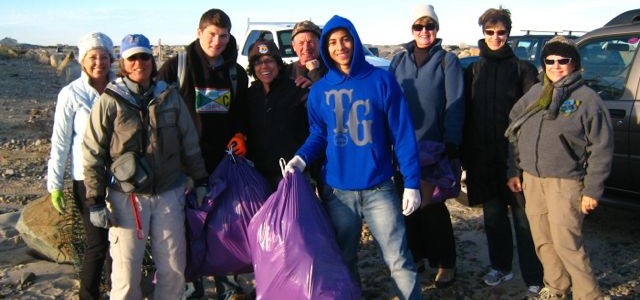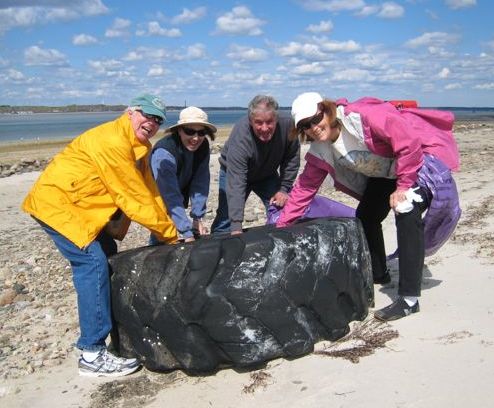
Since 1987, volunteers throughout Massachusetts have turned out for the annual COASTSWEEP cleanup organized by the Massachusetts Office of Coastal Zone Management (CZM). Each September and October, thousands of volunteers collect tons of trash from beaches, marshes, riverbanks and the seafloor. And, since 2010, volunteers have been cleaning up their favorite parks, beaches, trails and playgrounds for Plymouth Hometown Cleanup Day held twice each year. Now, you can participate in both at the same time! As part of COASTSWEEP and Fall 2015 Plymouth Hometown Cleanup, a local cleanup is being held at Long Beach from on October 25 (rescheduled from Oct. 3) from 1:00 p.m. to 3:30 p.m.
COASTSWEEP participants join hundreds of thousands of other volunteers in the world’s largest volunteer effort for the ocean—Ocean Conservancy’s International Coastal Cleanup—collecting trash, fishing line and other marine debris and recording data on what they find. This data is used to find solutions for keeping trash out of the ocean.
To volunteer for the Long Beach cleanup, please sign up by clicking here.
This will be the fifth Long Beach Cleanup organized by the Goldenrod Foundation. However, it is the first that will actually log data on what exactly is being picked up, which helps in planning how to prevent pollution in the first place. Volunteers will divide into teams and go to areas on the beach facing Plymouth Harbor. Prizes will be awarded for a variety of categories including “most unique item found.” It’s a fun way to help beautify Plymouth, make the beaches safer for wildlife and people and enjoy the outdoors.
Sources of marine debris include people littering, trash blowing out of cans, and cigarette butts washing into storm drains that connect to the ocean. Marine debris is more than an eyesore, it can also directly harm sea life and humans. Seabirds, seals and other animals are sometimes choked, starved or poisoned when they mistake debris for food, and wildlife can become entangled in nets, bags, ropes and other trash. Beachgoers may injure themselves on pieces of glass, wood or metal while swimming or walking on the sand. Debris also poses a threat to navigation—fishing line can jam propellers, large pieces of debris can collide with and damage boats, and plastic can clog cooling intakes. Because much of the trash collected each year comes from street litter, it is easily preventable by reducing your use of disposable items such as plastic straws and plastic bags, recycling and always using secure trash bins. To start now, try the trash-free challenge!

